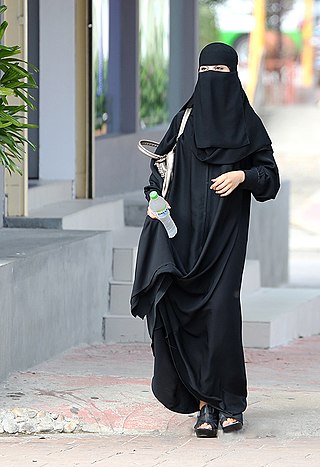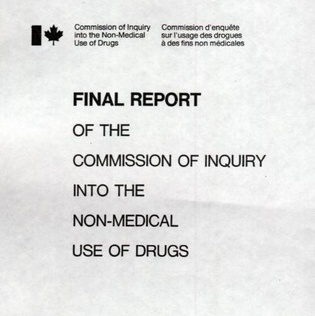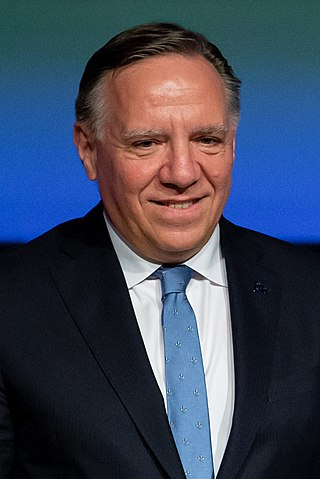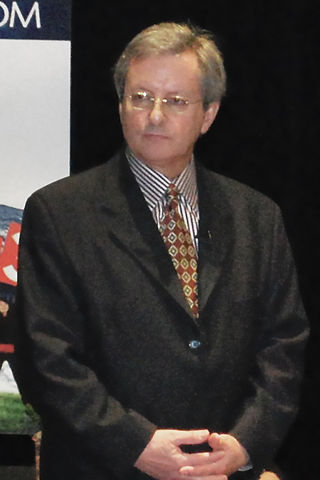Related Research Articles

This section of the Timeline of Quebec history concerns the events between patriation of the British North America Act and the present day.

The 1995 Quebec referendum was the second referendum to ask voters in the predominantly French-speaking Canadian province of Quebec whether Quebec should proclaim sovereignty and become an independent country, with the condition precedent of offering a political and economic agreement to Canada.

A niqāb or niqaab, also called a ruband, is a garment, usually black, that covers the face, worn by some Muslim women as a part of an interpretation of hijab. Muslim women who wear the niqab do so in places where they may encounter non-mahram (un-related) men. Somewhat controversial in some parts of the world, the niqab is most often worn in its region of origin: the Arab countries of the Arabian Peninsula – Saudi Arabia, Yemen, Oman, and the United Arab Emirates, where it is common and considered as culturally belonging to the region, though not compulsory.

The Commission of Inquiry into the Non-Medical Use of Drugs, often referred to as the Le Dain Commission after its chair Dean Gerald Le Dain, was a Canadian government commission that was begun in 1969 and completed its work in 1972.

Freedom of religion in Canada is a constitutionally protected right, allowing believers the freedom to assemble and worship without limitation or interference.
Anti-Quebec sentiment is a form of prejudice which is expressed toward the government, culture, and/or the francophone people of Quebec. This prejudice must be distinguished from legitimate criticism of Quebec society or the Government of Quebec, though the question of what qualifies as legitimate crticism and mere prejudice is itself controversial. Some critics argue that allegations of Quebec bashing are sometimes used to deflect legitimate criticism of Quebec society, government, or public policies.

François Legault is a Canadian politician serving as the 32nd premier of Quebec since 2018. A member of the Coalition Avenir Québec (CAQ), he has led the party since its founding in 2011. Legault sits as a member of the National Assembly (MNA) for the Lanaudière region riding of L'Assomption. Prior to entering politics, he was the co-founder of the Canadian airline Air Transat.

Philippe Couillard is a Canadian business advisor and former neurosurgeon, university professor and politician who served as 31st premier of Quebec from 2014 to 2018. Between 2003 and 2008, he was Quebec's Minister of Health and Social Services in Jean Charest's Liberal government and was MNA for Mont-Royal until he resigned in 2008. In the 2014 election, Couillard moved to the riding of Roberval, where he resides. He was the leader of the Quebec Liberal Party from 2013 to 2018. He resigned as Liberal leader and MNA on October 4, 2018.

Jean Tremblay is a Canadian businessman and politician who was mayor of Saguenay, Quebec, Canada from 2002 to 2017. Before that he was mayor of Chicoutimi since 1996.
The French term pure laine, refers to Québécois people of French-Canadian ancestry, especially those descended from the original settlers of New France who arrived during the 17th and 18th centuries. Terms with a similar meaning include de souche and old stock as in "Old Stock Canadians".
Fatima Houda-Pepin is a Quebec politician and a former member of the National Assembly of Quebec, Canada. She represented the La Pinière electoral district between 1994 and 2014, and was a member from the Quebec Liberal Party until 2014.
Yolande James is a former Quebec provincial politician. She was the first black female MNA and the youngest, as well as the first black cabinet minister in Quebec history. A member of the Quebec Liberal Party, she represented the multicultural riding of Nelligan in the Island of Montreal from 2004 to 2014.

In modern usage, ḥijāb (hijab) generally refers to the customary Islamic female headcovering. Wearing hijab is mandatory in certain Islamic countries, and optional or restricted in other majority Muslim and majority non-Muslim countries. In the Indonesian Aceh province, Muslim women are required to wear the hijab and all women are required to do so regardless of religion in Iran and Afghanistan. In countries such as Saudi Arabia, the hijab is not required. Meanwhile, in Gaza, Palestinian school officials have voted to require young girls to wear hijab.
Michel Bourdon was a union leader, journalist, and politician in the Canadian province of Quebec. During the 1970s, he played a major role in exposing corrupt practices in Quebec's construction industry. He later served in the National Assembly of Quebec from 1989 to 1996 as a member of the Parti Québécois (PQ).
The Charter of Quebec Values was Bill 60 in the Canadian province of Quebec, introduced by the governing Parti Québécois in 2013 under Premier Pauline Marois, trying to legislate the Quebec controversy on reasonable accommodation. The PQ cabinet member forwarding the bill was Bernard Drainville, Minister responsible for Democratic Institutions and Active Citizenship. Premier Marois also threatened invoking the notwithstanding clause of the Constitution of Canada to pass the Charter in 2013. There was much controversy in Quebec and elsewhere about the charter, especially its proposed prohibition of public sector employees from wearing or displaying conspicuous religious symbols.
Islamophobia in Canada refers to a set of discourses, behaviours and structures which express feelings of anxiety, fear, hostility and rejection towards Islam or Muslims in Canada. Members of the Sikh, Christian Arab, Jewish and Hindu communities have all reported incidents of harassment which, while intended towards Muslims, was traumatic and broader in its scope than just Muslims.
Zunera Ishaq is a Canadian Muslim woman living in Mississauga, Ontario, Canada, who was at the centre of a debate about the right to wear a niqāb— a veil that covers most of the face—when taking the Oath of Citizenship at a public citizenship ceremony administered under the Citizenship Act, RSC 1985, c C-29, which became a point of controversy during the 2015 Canadian federal elections.

The Act respecting the laicity of the State, also known as Law 21, is a Quebec provincial statute enacted on June 16, 2019. It provides that "The State of Québec is a lay State." It prohibits the wearing of religious symbols by certain public servants and contractors, including teachers in the public-school system and prosecutors, while grandfathering people who were already in office when the Act was introduced. The Act operates in spite of the Quebec Charter of Human Rights and Freedoms, and also notwithstanding certain sections of the Canadian Charter of Rights and Freedoms.
English-speaking Quebecers, also known as Anglo-Quebecers, English Quebecers, or Anglophone Quebecers or simply Anglos in a Quebec context, are a linguistic minority in the francophone province of Quebec. According to the 2011 Canadian census, 599,225 people in Quebec declare English as a mother tongue. When asked, 834,950 people reported using English the most at home.

The burqa is worn by women in various countries. Some countries have banned it in government offices, schools, or in public places and streets.
References
- ↑ Pratiques d'accommodements reliées aux différences culturelles. . Government of Quebec press release. 8 February 2007.
- ↑ "Bouchard and Taylor Will Have to Speak, Too". The Gazette. Montreal. 22 August 2007. Archived from the original on 26 October 2012. Retrieved 14 December 2012.
- ↑ Tasker, J.P. (27 Mar 2015). "Stephen Harper 'dumb' to say niqab is anti-women, Charles Taylor says". CBC News . Retrieved 3 Jul 2022.
- ↑ Chris Selley (1 Apr 2015). "Charles Taylor ... Niqab Defender?". National Post . Retrieved 3 Jul 2022.
- ↑ Yakabuski, Konrad (3 Oct 2018). "Legault gets ahead of himself on the notwithstanding clause". The Globe and Mail . Retrieved 3 Jul 2022.
- ↑ Riga, Andy (19 Oct 2018). "Charles Taylor on religious garb ban: 'Dangerous, appalling, divisive'". Montreal Gazette . Retrieved 3 Jul 2022.
- ↑ "Crucifix removed from National Assembly's Blue Room". CBC News . 9 Jul 2019. Retrieved 3 Jul 2022.